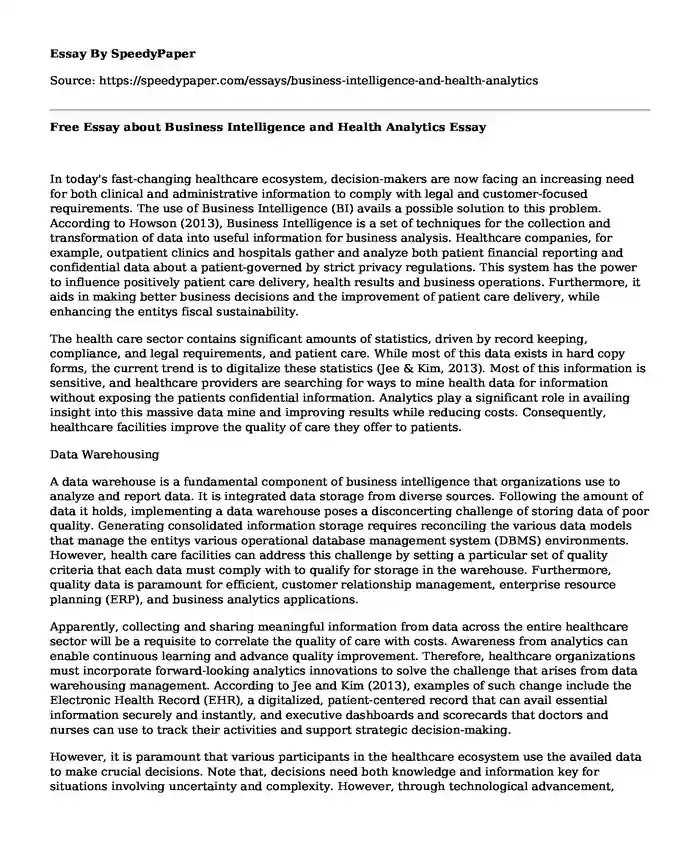
| Type of paper: | Essay |
| Categories: | Health and Social Care Business |
| Pages: | 3 |
| Wordcount: | 700 words |
In today's fast-changing healthcare ecosystem, decision-makers are now facing an increasing need for both clinical and administrative information to comply with legal and customer-focused requirements. The use of Business Intelligence (BI) avails a possible solution to this problem. According to Howson (2013), Business Intelligence is a set of techniques for the collection and transformation of data into useful information for business analysis. Healthcare companies, for example, outpatient clinics and hospitals gather and analyze both patient financial reporting and confidential data about a patient-governed by strict privacy regulations. This system has the power to influence positively patient care delivery, health results and business operations. Furthermore, it aids in making better business decisions and the improvement of patient care delivery, while enhancing the entitys fiscal sustainability.
The health care sector contains significant amounts of statistics, driven by record keeping, compliance, and legal requirements, and patient care. While most of this data exists in hard copy forms, the current trend is to digitalize these statistics (Jee & Kim, 2013). Most of this information is sensitive, and healthcare providers are searching for ways to mine health data for information without exposing the patients confidential information. Analytics play a significant role in availing insight into this massive data mine and improving results while reducing costs. Consequently, healthcare facilities improve the quality of care they offer to patients.
Data Warehousing
A data warehouse is a fundamental component of business intelligence that organizations use to analyze and report data. It is integrated data storage from diverse sources. Following the amount of data it holds, implementing a data warehouse poses a disconcerting challenge of storing data of poor quality. Generating consolidated information storage requires reconciling the various data models that manage the entitys various operational database management system (DBMS) environments. However, health care facilities can address this challenge by setting a particular set of quality criteria that each data must comply with to qualify for storage in the warehouse. Furthermore, quality data is paramount for efficient, customer relationship management, enterprise resource planning (ERP), and business analytics applications.
Apparently, collecting and sharing meaningful information from data across the entire healthcare sector will be a requisite to correlate the quality of care with costs. Awareness from analytics can enable continuous learning and advance quality improvement. Therefore, healthcare organizations must incorporate forward-looking analytics innovations to solve the challenge that arises from data warehousing management. According to Jee and Kim (2013), examples of such change include the Electronic Health Record (EHR), a digitalized, patient-centered record that can avail essential information securely and instantly, and executive dashboards and scorecards that doctors and nurses can use to track their activities and support strategic decision-making.
However, it is paramount that various participants in the healthcare ecosystem use the availed data to make crucial decisions. Note that, decisions need both knowledge and information key for situations involving uncertainty and complexity. However, through technological advancement, healthcare providers have access to a computer-based decision support system that supports decision-making under these conditions. It promotes facts-based decisions, improves their quality, and enhances the efficiency of the decision-making processes. Therefore, it is significant in knowledge management in the healthcare sector.
Health Information Technology
The healthcare ecosystem consists of hospitals, funding companies, and the government. Following the sensitivity of patients information, managing and sharing it in a secure manner is inevitable. Health Information Technology consists of a broad range of technologies that ensure the safety of confidential patients data, for instance, the Electronic Health Record (EHR). Their essential characteristics include digitalization, password secured, accessible only by authorized personnel (Howson, 2013). Moreover, all the information exists on a centralized server, and authorized users can access it from any location.
Conclusion
To conclude, Business Intelligence is crucial for managing and sharing information in the healthcare sector securely. Indeed, developing and implementing technological applications and systems in all clinical, administrative, and financial procedures play an essential role in promoting delivery of quality healthcare. Moreover, all end users in the industry have instant access to knowledge relevant to their particular operations.
References
Howson, C. (2013). Successful business intelligence: Unlock the value of BI & big data.
Jee, K., & Kim, G. H. (2013). Potentiality of big data in the medical sector: focus on how to reshape the healthcare system. Healthcare informatics research, 19(2), 79-85.
Cite this page
Free Essay about Business Intelligence and Health Analytics. (2019, Nov 11). Retrieved from https://speedypaper.net/essays/business-intelligence-and-health-analytics
Request Removal
If you are the original author of this essay and no longer wish to have it published on the SpeedyPaper website, please click below to request its removal:
- MBTI and DISC Comparison And Contrast
- Baltimore City Neighborhood Overview, Essay Example
- Nutrition Essay Example on Paleo Diet
- Free Essay on Discretion and the Criminal Justice Professional for Judges
- Characteristics of the Enlightenment in the Literature - Essay Example
- Globalization and Thomas Friedman (Angelina Haugerud). Free Essay
- Achieve Your Brand: Defining Your Unique Identity - Essay Sample
Popular categories




